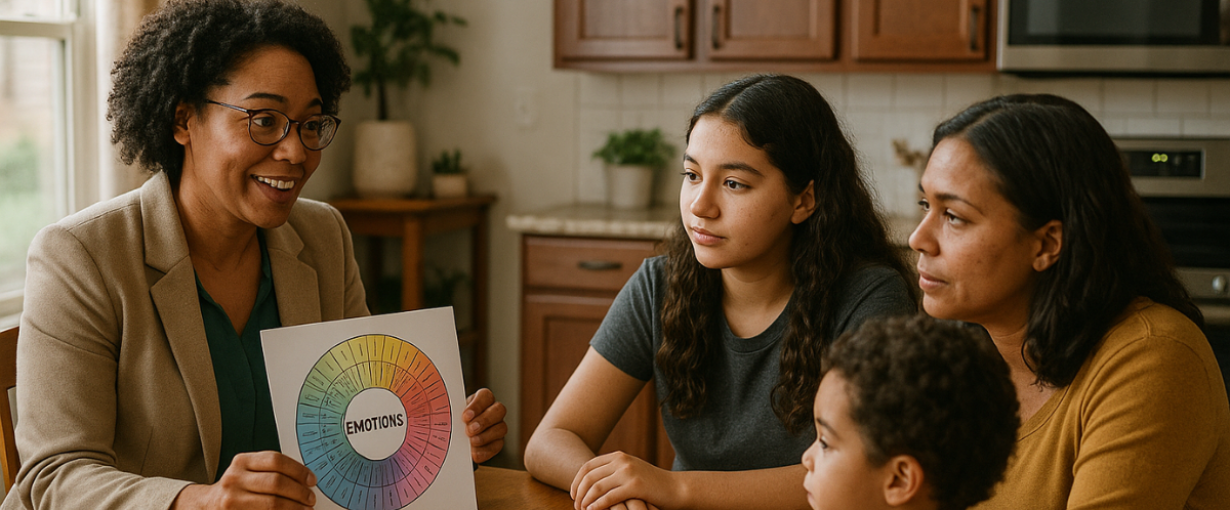
When it comes to caring for a loved one with mental health challenges, developmental differences, or behavioural needs, navigating the landscape of support options can feel overwhelming. From finding qualified professionals to coordinating services within your own home, the process often leaves families feeling exhausted before they even begin. In Oklahoma, however, there’s a growing recognition of this gap and encouragingly, a growing number of in-home support services designed to bridge it.
Whether you’re a parent supporting a child with special needs, a caregiver assisting a relative in crisis, or simply someone seeking to understand the state’s family-centered care system, this guide is for you. We’ll explore what Family Support Services In Oklahoma City look like today, who provides them, how in-home models differ from traditional therapies, and what families can do to access these essential supports.
Understanding In-Home Support Services
Let’s begin with the basics: What exactly are in-home support services?
At their core, these services bring therapeutic, educational, and behavioural support directly into the home environment. This approach isn’t just about convenience. It’s about meeting individuals, especially children, where they are most comfortable. For many families, especially those navigating complex diagnoses or systemic barriers, the home is where real-life challenges unfold. That’s also where meaningful growth can happen.
In Oklahoma, in-home supports can include a range of services such as:
- Behavioural health counselling
- Parent training and coaching
- Skill-building for children or teens
- Respite care for caregivers
- Crisis intervention
- Therapeutic mentoring
It’s not uncommon for families to blend these offerings with external resources like school-based services, outpatient therapy, or community workshops.
Why In-Home Matters: One Family’s Story
A mother I recently worked with in Oklahoma City shared that her 10-year-old son, recently diagnosed with autism spectrum disorder and generalized anxiety, had been in and out of outpatient therapy for years. “He would shut down the moment we walked into a clinic,” she told me. “But when the therapist came into our living room, sat on the floor, and played LEGOs with him? That’s when things started to change.”
Stories like hers aren’t rare. In-home services often unlock therapeutic progress because they remove the barriers that come with sterile environments or rigid structures. Therapists can observe family dynamics in real-time, tailor interventions to the child’s daily routines, and empower parents with strategies they can apply in the moment.
What Types of In-Home Support Are Available in Oklahoma?
Here’s a breakdown of some of the more common in-home services offered throughout Oklahoma, particularly in the Oklahoma City metro area:
1. Family Support Services
These are often facilitated by local nonprofits and behavioural health organizations. The goal is to strengthen the entire family unit, not just focus on the “identified patient.” Services might include:
- Conflict resolution strategies
- Parent-child communication coaching
- Trauma-informed parenting education
- Resource navigation (like help with DHS or school IEP meetings)
Organizations like Open Arms Initiative in Oklahoma City offer exactly this kind of wraparound support. By integrating trauma-informed care and community engagement, they help families not only survive but begin to thrive.
2. Personal Development Therapy
This is a growing field in Oklahoma and goes beyond clinical counselling. Personal development therapy can include goal-setting, emotional regulation, mindfulness practices, and even vocational coaching tailored to a client’s age and cognitive level.
In-home personal development services often focus on adolescents or young adults who struggle with motivation, anxiety, or social skills. A therapist might spend an hour each week helping a teen develop routines, practice coping skills during actual stress moments, or build confidence in real-life settings.
If you’re looking for Personal Development Therapy in Oklahoma City, many community clinics and licensed family therapists now offer in-home versions of these services, especially for youth in foster care or juvenile diversion programs.
3. Mental Health Training for Families
This is a unique and empowering service that Oklahoma providers are increasingly offering. It’s one thing to have a therapist work with your child. It’s another to feel equipped as a parent to reinforce those skills.
Some organizations provide structured Mental Health Training in Oklahoma City specifically for caregivers. These programs might include:
- Psychoeducation about trauma, ADHD, anxiety, etc.
- Tools for de-escalation
- Understanding emotional triggers and attachment theory
- Training in safety planning and crisis management
Often, these sessions are delivered in-home so that strategies can be personalized to your household context, your routines, your language, your dynamics.
Who Qualifies for In-Home Support in Oklahoma?
Eligibility varies depending on the program, funding source, and diagnosis. Here are the most common pathways:
- Medicaid/SoonerCare: Many in-home services, especially for children with behavioural or mental health diagnoses, are covered under Sooner Care. You’ll likely need a referral from a primary care provider or mental health professional.
- Private Insurance: Coverage is expanding, but it’s best to check with your plan. Some policies only cover in-home services when medically necessary.
- Foster or Adoptive Families: If you’re a foster or adoptive parent, you may qualify for state-funded services through OKDHS or third-party providers.
- Low-Income Families: Many community nonprofits offer sliding-scale or grant-funded services for families who meet income eligibility guidelines.
How to Find In-Home Support Providers
Oklahoma doesn’t yet have a centralized directory for in-home service providers, but here are some tips for finding support:
- Start by contacting the school’s support staff. They often know which local agencies have in-home programs.
- Connect with nearby nonprofits like Open Arms Initiative or Sunbeam. Many have dedicated family support or mental health outreach coordinators.
- Ask your paediatrician or primary care provider for a referral. Mental health screenings can often unlock additional service eligibility.
- Dial 2-1-1 for local support options across Oklahoma.
What to Expect from an In-Home Program
While each program is unique, here are some things you can generally expect:
- An intake assessment, where a licensed provider evaluates your family’s needs and goals.
- Flexible scheduling, many providers offer evening and weekend appointments for convenience.
- A tailored service plan, co-developed with your input.
- Collaborative care, with communication between in-home providers, school staff, case managers, and any outpatient therapists involved.
- Cultural sensitivity, especially in programs trained in trauma-informed or equity-centered practices.
It’s also worth noting that in-home services are confidential and adhere to HIPAA guidelines. Many families report that they feel more seen and respected in their own homes than in traditional clinical settings.
Barriers and How to Overcome Them
While in-home services are a lifeline for many families, they’re not without challenges. The most common barriers include:
- Waitlists, especially for Medicaid-approved providers.
- Stigma, particularly in rural or underserved communities, where mental health support is still taboo.
- Logistics, such as internet access for virtual in-home visits or lack of privacy in multi-family homes.
Here’s what I tell families facing these hurdles: Start somewhere. Even monthly visits can lead to meaningful progress, and remember advocacy matters. If a provider isn’t meeting your family’s needs, you have the right to ask questions, request a new clinician, or seek alternatives.

The Bigger Picture: Why This Matters
Investing in in-home support services isn’t just about managing a crisis; it’s about changing the trajectory of a child’s life. When families are equipped with tools, language, and healing spaces, we reduce future hospitalizations, prevent school dropouts, and strengthen generational resilience.
Final Thoughts: Home is Where Healing Begins
For families in Oklahoma, in-home support services offer more than just therapy; they offer connection, empowerment, and a chance to rebuild from the inside out. Whether you’re navigating trauma recovery, behavioural challenges, or developmental concerns, the right support can truly transform a home into a place of progress.
The journey may not be linear. It rarely is. But with compassion, access, and community, change is possible one living room session at a time.
